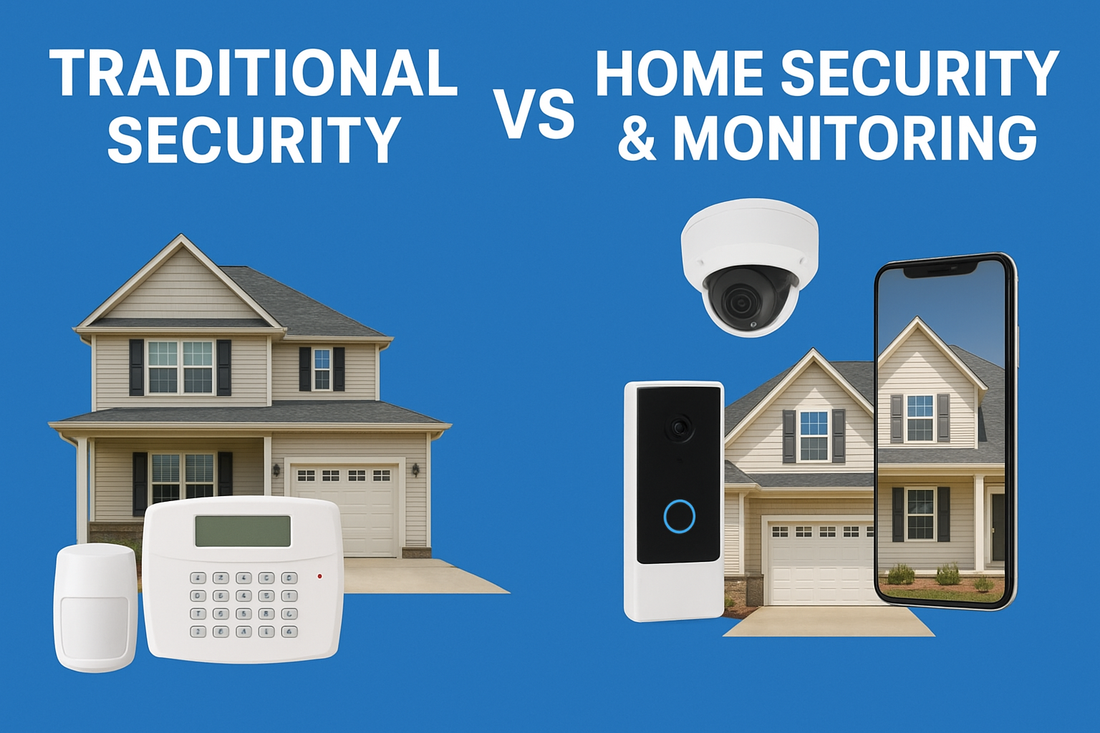
Home Security & Monitoring vs Traditional Security: A Complete 2025 Guide by Synapik
Security in a Changing World
For decades, homeowners have relied on traditional security systems such as basic alarms, locks, and guard services. While these solutions provided protection in the past, modern threats and lifestyles demand more advanced solutions.
In 2025, Home Security & Monitoring has become the new standard, offering real-time alerts, AI-driven detection, and smart home integration. At Synapik, we lead this transformation by offering advanced monitoring systems that keep families secure, connected, and informed.
This guide explores the differences between Home Security & Monitoring and traditional systems, helping you understand why smart solutions are the future of home protection.
Understanding Traditional Security Systems
Traditional systems rely on:
-
Locks and deadbolts
-
Basic burglar alarms
-
Neighborhood watch or guard patrols
-
Hardwired CCTV systems
While useful, these systems lack real-time intelligence and flexibility.
What Is Home Security & Monitoring?
Modern security goes beyond physical barriers. Synapik’s Home Security & Monitoring solutions include:
-
Smart cameras with AI-powered detection
-
Cloud and local storage for video evidence
-
Mobile app control with 24/7 access
-
Smoke, gas, and fire detection sensors
-
Smart doorbells and package monitoring
-
Integration with IoT smart homes
Key Differences: Traditional vs Smart Monitoring
| Feature | Traditional Security | Home Security & Monitoring (Synapik) |
|---|---|---|
| Response Time | Delayed, often after the event | Real-time alerts and remote access |
| Installation | Complex wiring | Easy DIY or professional setup |
| Coverage | Limited to doors/windows | Full home + environment monitoring |
| Cost | Lower upfront, higher maintenance | Higher upfront, long-term savings |
| Integration | Standalone | Smart home ecosystem ready |
| Accuracy | Many false alarms | AI reduces false alerts |
| User Control | Manual | Remote, automated, and AI-assisted |
Benefits of Home Security & Monitoring Over Traditional Security
1. 24/7 Remote Access
Unlike traditional systems, Synapik allows you to monitor your home from anywhere in the world via smartphone apps.
2. AI-Powered Alerts
Traditional alarms often trigger false alerts. Synapik’s AI can distinguish between pets, people, and vehicles.
3. Complete Home Protection
While traditional systems focus only on break-ins, Synapik covers fire, smoke, carbon monoxide, and even package theft.
4. Scalability
Traditional systems are hardwired and fixed. Synapik’s solutions can expand room by room, indoors or outdoors.
5. Integration with Daily Life
Traditional systems are standalone. Synapik integrates with lighting, locks, and thermostats, making security part of your lifestyle.
Cost Comparison: Traditional vs Synapik Smart Security
-
Traditional Security: Low upfront but high ongoing costs (maintenance, guards, false alarm fees).
-
Synapik Smart Security: Higher upfront but lower long-term costs, with fewer replacements and reduced insurance premiums.
Over 5 years, most families save 30–40% by switching to Home Security & Monitoring.
Why Synapik Is the Smarter Choice
At Synapik, we prioritize security, convenience, and sustainability. Our systems offer:
-
End-to-end encryption for privacy protection
-
AI-powered monitoring for accuracy
-
Smart home integration for convenience
-
Durable, weather-resistant hardware for longevity
By choosing Synapik, you’re upgrading to a smarter, safer, and future-ready solution.
FAQs About Home Security & Monitoring vs Traditional Security
Q1: Are smart systems harder to install than traditional ones?
No. Most Synapik products are plug-and-play, unlike traditional wired systems.
Q2: Do smart security systems need internet?
Yes, but Synapik offers backup modes for power or Wi-Fi outages.
Q3: Can traditional security systems be upgraded to smart ones?
Yes. Synapik provides hybrid solutions for gradual upgrades.
Q4: Which is more cost-effective in the long run?
Smart systems save more money over time due to lower maintenance and energy use.
Q5: Are traditional systems still useful?
Yes, but they are best used as part of a broader Synapik smart ecosystem.
Q6: Is Synapik secure from hacking?
Yes. Our encrypted servers and multi-layer security protect against cyber threats.
The Future Belongs to Smart Security
The comparison is clear: Home Security & Monitoring far outperforms traditional systems in terms of reliability, safety, and convenience.
By adopting Synapik’s smart security solutions, you’re ensuring your home isn’t just protected today—it’s ready for tomorrow’s challenges.
